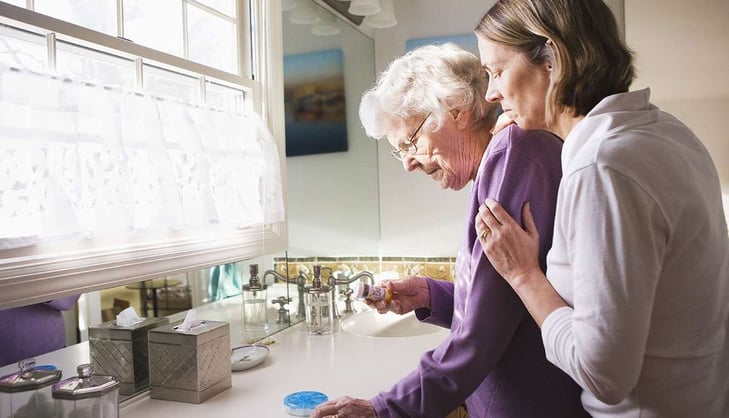 Are you visiting your elderly parents over Easter break, or planning a visit soon? If your parents are aging in place at their homes, take the opportunity to assess how well they’re maintaining their independence.
Are you visiting your elderly parents over Easter break, or planning a visit soon? If your parents are aging in place at their homes, take the opportunity to assess how well they’re maintaining their independence.
At some point, every older adult will need assistance to meet the daily requirements of life. That help may come in the form of senior living case management or in-home nursing care. It may come in the form of a move to a retirement community, an assisted living facility or, when necessary, a skilled nursing center.
But how do you know when it's the appropriate time to get Mom or Dad extra help? What are some of the warning signs that an older loved one is unable to keep up with his or her own needs, or that he or she is in danger?
Let's take a look at some of the signs and symptoms you should be keeping an eye out for this weekend and tips you can use for keeping the seniors in your life safe.
1. How’s the mood and conversation?
Does your parent seem down? Is he or she overly quiet or withdrawn? Does he or she seem irritable, angry, irrational or aggressive? Do conversations seem to take dark or nihilistic turns?
Many seniors — particularly those who live alone after a partner has moved into inpatient nursing care or passed away — face intense loneliness. Some withdraw from family and friends. Some begin to lose hope. These are serious warning signs that a person might be suffering from clinical depression.
As you might imagine, negative mental health changes can have serious consequences for an elder loved one's physical health. Clinical depression is linked with increased risk of heart attacks, advancing dementia and acute psychiatric conditions (including suicidal thoughts).
If you notice that your aging parent's mood or personality has undergone dramatic shifts, you should kindly and gently voice your concerns. Encourage your parent to see his or her primary care doctor for an assessment.
Discuss ways that he or she can get out of the house and spend time with others, either visiting or volunteering. Offer to help arrange rides to social engagements, counseling appointments or other support channels.
Most of all, make sure you are making regular time to phone, email and visit your parents. Make sure they know you value and love them.
2. Is the home cluttered, unsecured or unsafe?
Everyday tasks like climbing stairs, taking a shower or bath or cooking food can become very difficult for an aging parent if he or she suffers from visual impairment, reduced mobility or chronic pain.
 Unfortunately, trips and falls over household obstacles are among the leading causes of serious injuries that often land seniors in the emergency room — or in the ICU. In fact, falls are the second-leading cause of accidental death worldwide. Seniors 65 years and older suffer disproportionately from them.
Unfortunately, trips and falls over household obstacles are among the leading causes of serious injuries that often land seniors in the emergency room — or in the ICU. In fact, falls are the second-leading cause of accidental death worldwide. Seniors 65 years and older suffer disproportionately from them.
Conduct a visual safety check of the home as you visit your aging parent to reduce the risk of your parent incurring a trip-and-fall injury.
AARP has published a handy home safety checklist that you can print out and take with you. While your parent visits with the kids and other relatives, take a walk around the home and use the checklist to assess the safety of your parent's home environment.
If you find issues, address them by helping your parent to make minor modifications to the home that will assist his or her navigation and increase safety.
For example, you can install handrails, grab bars and non-slip mats in hallways bathrooms and the kitchen, and raise toilet seats to enable easier transfer from a standing to a seated position.
Add a peephole and chain lock on the front door, or automatic exterior lights, to improve your loved one's security. Install an automatic garage door opener to help your parent get in and out without having to stoop to raise a door. And lower kitchen shelves so that they are within your parent's easy reach.
3. How does your parent appear?
Is your parent dressed appropriately? Clean and well-groomed? Does he or she appear to be gaining or losing a lot of weight? Does he or she lose track of important dates, seem easily confused or ask repeated questions even after the answer is given?
Any of these could be a sign that your parent's ability to self-manage is deteriorating. And if an older loved one seems to be lost or wanders, it's definitely time to bring additional care resources into the mix.
Use your best judgment. If you notice these signs and bring them to your parent's attention, do so gently. Employ the support of others in the family. If your parent is resistant to moving into assisted living or accepting in-home nursing care when the situation is becoming obviously unsafe, you might enlist a doctor, priest or minister, friends or other family members to support you and to present a gentle but unified front.
Remember, elderly parents who are living with dementia or cognitive disorders can feel very vulnerable. Sometimes, they realize something isn't quite right with their memories or with their ability to process information, but they don't know what to do and feel easily overwhelmed. The key is to approach them gently and patiently with options.
Use the safety tips above to keep the seniors in your life happy and well.
Aging in place has many advantages for an elderly parent, insofar as it can be accomplished safely. If your parent is passing the point at which he or she can effectively self-manage, it’s not wrong to seek additional help.
If aging at home can still proceed with appropriate in-home care, that’s well and good. But if your parent's mental or physical condition requires more constant attention, it may be the right time to consider a move to a retirement community or to assisted living.












